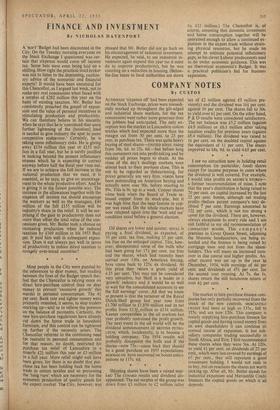COMPANY NOTES
By CUSTOS
ALTHOUGH 'sixpence off' had been expected on the Stock Exchange, prices were immedi- ately marked up throughout the gilt-edged and industrial share markets, for the tax concessions were rather more generous than the jobbers had anticipated. The only ex- ception was the market in Lancashire cotton textiles which had expected more than the meagre cut from 50 per cent. to 25 per cent. in purchase tax. There was quite heavy buying of steel shares—UNITED STEEL rising from 34s. 6d. to 35s. 6d.—but before long this movement ran into profit-taking and by midday all prices began to shade. At the close of the day's dealings markets were almost back to their previous close. This is not fo be regarded as disheartening, for prices generally are very firm. FORDS have been outstanding on American buying and actually went over 90s. before reacting to 89s. This is 9s. up in a week. Copper shares came back when the Board of Trade re- leased copper from its stock-pile, but it was high time that the near-famine in cop- per was eased. On the whole markets have now relapsed again into the 'wait and see' condition usual before a general election.
+
Oil shares are lower and quieter. SHELL is paying a final dividend, as expected, of 10 per cent. tax free, making 15 per cent. tax free on the enlarged capital. This, how- ever. disappointed sonic of the bulls who had been going for 17i per cent. tax free and the'shares, which had recently, been carried over 130s. on American buying, have conic back to 125s. ex dividend. At this price they return a gross yield of 4.35 per cent. This may not be considered very attractive, but Shell is a leader in a 'growth' industry and it would be as well to wait for the consolidated accounts to see the full earnings' cover. All that we know at present is that the turnover of the Royal Dutch-Shell group last year rose from £1.700 million to £1,850 million and its net profits from £13p„million to £134 million. Keener competition in the oil markets last year probably restrained the profit growth. The next event in the oil world will be the dividend announcement of BRITISH PETRO- LEUM, which, incidentally, is to become a holding company. The 1954 results will probably disappoint the bulls and if the shares—now 75s.—come back they should be a good purchase, on 1955 expectations. BURMAH OIL have recovered on bonus antici- pations to 117s. 6d.
f
tax of £2 million against £3 million pre- viously) and the dividend was 16+ per cent. against 16 per cent. The shares fell to 30s. to yield over 6-1 per cent. On the other hand, P & 0 results were considered satisfactory. The net balance was £5.2 million (against £4.9 million) or £6.1 million after taking taxation credits for previous years (against £5.4 million). The dividend was raised to 16 per cent. on the doubled capital against the equivalent of 11 per cent. The shares improved to 68s. 9d. to yield 4.65 per cent.
I see no attraction now in holding retail consumption (in particular, food) shares except for income purposes in cases where the dividend is well covered. For example, I would take profits on MOORE'S STORES-:- a former recommendation of mine. 1 note that the year's distribution is being raised to 20 per cent. on capital increased by the last 25 per cent. bonus, although net trading profits (before parent company's tax) de- clined 7 per cent. Earnings amounted to 32+ per cent., which is not too strong a cover for the dividend. There are, however, always exceptions to every rule and I am still faithful to my old recommendation of CONNAUGHT ROOMS. This company's premises in Great Queen Street, adjoining the Masonic headquarters, are being ex- tended and the finance is being raised by mortgage loan and not from the share- holders. This will mean an increased turn- over in due course and higher profits. An- other record wasp set up in the year to December, 1954, with earnings of 66 per cent. and dividends of 47+ per cent. for the second year running. At 7s. the Is. shares return the still handsome return of over 6+ per cent.
•
The market in hire-purchase finance com- panies has only partially recovered from the shock of the new controls. MERCANTILE CREDIT had been as high as 135s., fell to I I5s. and are now 120s. This company is mainly supplying hire-purchase finance for capital goods and having raised money from its own shareholders it can continue its normal course of expansion. It has sub- sidiary companies trading successfully in South Africa, and Eire. I first recommended these shares when they were 56s. At 120s. to yield 43. per cent. on dividends of 25 per cent., which were last covered by earnings of 65 per cent., they still represent a good investment holding. I would not rush in to buy, but on reactions the shares are worth picking up. After all, Mr. Butler stands for industrial expansion and Mercantile Credit finances the capital goods on which it all depends.










































 Previous page
Previous page